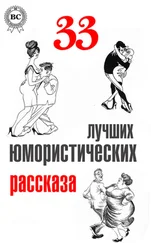billmen– foot soldiers armed with billhooks (originally developed from a farming tool, and consisting of an axe and hook on a long pole)
yester eve– yesterday evening
Henry VIII is said to have waited for and met Anne Boleyn– Henry Tudor, King of England, married six times, beheaded two of his wives and was the prime mover of the English Reformation. Anne Boleyn was the second wife of Henry VIII (married in 1533)
the Irish questionis how to deal with the Irish uprisings and calls for independence from Britain, as from 1801 to 1921 it was a part of the UK
Edward the Confessor– one of the last Anglo-Saxon kings of England (1003–1066), ruling from 1042 to 1066
Earl Godwin– a large landowner in England. Although an Anglo-Saxon, Godwin decided to support the Dane, Cunate the Great, when he became king of England in 1016. Cunate appointed Godwin as the Earl of Wessex
August Bank Holiday– the summer bank holiday was introduced in 1871 and originally intended to give bank employees the opportunity to participate and attend cricket matches. Nowadays for many people the summer bank holiday marks the end of summer as it is on the last Monday of August
Marlow Manor owned Saxon Algar for its lord, ere conquering William seized it to give to Queen Matilda, ere it passed to the Earls of Warwick or to worldly-wise Lord Paget, the councillor of four successive sovereigns. – Aelfgar III was a great Saxon thane; ere = before; conquering William = William the Conqueror (1028–1087), the first Norman King of England, reigning from 1066 until his death in 1087; Queen Matilda (1102–1167), the daughter and heir of King Henry I of England. Earl of Warwick is one of the most prestigious titles in the peerages of the United Kingdom. William, Lord Paget (1506–1563), Keeper of the Seals, councilor of Henry VIII, Mary, Charles V, Elisabeth
Knights Templar(s)– in other words, the Order of the Temple or the Poor Fellow-Soldiers of Christ and of the Temple of Solomon; well-known medieval military and religious order finally suppressed for its power and wealth
Anne of Cleves(1515–1557) – the fourth wife of King Henry VIII
Warwick, the king-maker– Richard Neville, 16th Earl of Warwick (1428–1471), an English nobleman and Steward of the Duchy of Lancaster. His political connections were great. He was one of the Yorkist leaders in the Wars of the Roses, and took part in the deposition of two kings
a nd Salisbury, who did good service at Poitiers– Salisbury was the father of Warwick; Poitiers was a city in central France, scene of the battle (1356) in which the English defeated the French
from the times of King Sebert and King Offa– King Sebert (604–616), King of Essex, the first East Saxon Christian king; King Offa was the King of Mercia (757–796) who constructed an earthwork between Wales and Mercia
Medmenham monks, or Hell Fire Clubwas sort of a cross between the Dead Poets Society and a risqué Playboy club.
Wilkes– John Wilkes (1725–1797) was an English radical politician and journalist.
Lowther Arcade– a store where one could buy children’s toys
revictualled– supplied provisions
Henley week – time for Henley Royal Regatta
beanfeast– a celebrating party with plenty of food and drink, given to workpeople by their employer
Messrs. Cubit’s– Thomas Cubitt (1788–1855), the leading master builder in England
Bermondsey Good Templars– charitable organization on the excursion
Who shall escape calumny– from “Hamlet” by William Shakespeare (Act 3, Scene 1)
Leslie, R.A. – Charles Robert Leslie (1794–1859), an English genre painter; R.A stands for “Royal Academician”
Hodgson– either John Hodgson Lobley (1878–1954), an English
artist best known for his work as an official war artist for the Royal Army Medical Corps during World War I, or David Hodgson, a British visual artist (1798–1864)
Tennyson– Alfred Tennyson (1809–1892), established himself as the most popular poet of the Victorian era, with its sentimentalism and conservatism
’Arry and Lord Fitznoodle– that is, common people and nobility (’Arry = Harry, rude but merry cockney).
Irish stew– thick stew of mutton, onions and potatoes
half a peck– a measure for dry goods equal to two gallons. Half a peck is equal approximately to four littres.
German sausage– a large kind of sausage with spiced, partly cooked meat
a mouch– an aimless walk
the Babes in the Wood– traditional children’s tale of two children abandoned in a wood; commonly meaning innocents in any dangerous situation
the Seven Sleepers– the “Seven Sleepers of Ephesus”, a group of Christian youths who hid inside a cave to escape a persecution during the reign of the Roman emperor Decius. They awoke 180 years later during the reign of Theodosius II
toddy– punch
river hand– hand = a sailor
throw out a wing– to build a new part of the house
“raw ’un”– raw (meaning ‘new’) one
rounders and touch– both are children’s games
take in a reef– to reduce the area of the sail
luff– sail closer into the wind
top-jib– a headsail
King Ethelred– byname Ethelred the Unready, (968?–1016), King of the English from 978 to 1013 and from 1014 to 1016. He failed to prevent the Danes from overrunning England
the Parliamentary strugglebetween the Crown and Parliament happened under Charles I. It led to the English Civil War in 1642. Those supporting the Parliament were called Parliamentarians or ‘Roundheads’.
the Earl of Essex– Robert Devereux, 3rd Earl of Essex (1591–1646) was an English Parliamentarian
Читать дальше
Конец ознакомительного отрывка
Купить книгу
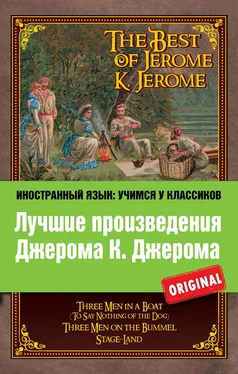
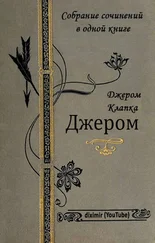





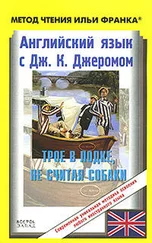
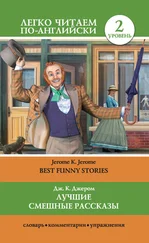
![Джером Джером - Избранные произведения в одном томе [Компиляция, сетевое издание]](/books/426293/dzherom-dzherom-izbrannye-proizvedeniya-v-odnom-tome-thumb.webp)


